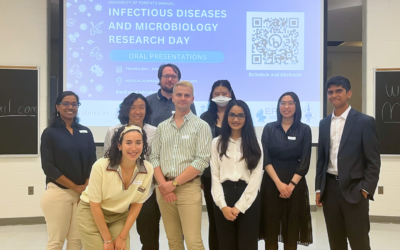News & Events
Events
News
MD/PhD student Hannah Kozlowski receives inaugural Future Leaders Prize
Hannah Kozlowski is the inaugural recipient of the Future Leaders Prize from the Emerging and Pandemic Infections Consortium. The prize, to be awarded annually, recognizes outstanding PhD graduates at the University of Toronto who have completed an excellent infectious disease-focused thesis and demonstrated leadership outside of their scientific studies.
Climate Change and Infectious Diseases Speaker Series
How is climate change shifting and accelerating the spread of infectious diseases around the world? What are some of the impacts on societies, economics, and human and ecological health? These were some of the topics that we wanted to address through the public speaker series we cohosted earlier this year with Climate Positive Energy and the Institute for Pandemics, two other Institutional Strategic Initiatives at the University of Toronto.
Two U of T teams partner with Moderna to develop new mRNA-based tools to target HIV and other diseases
From left to right: Mario Ostrowski, Haissi Cui and Landon Edgar July 27, 2023 By Betty Zou and Mayuri Punithan Two teams of researchers at the University of Toronto have partnered with Moderna Canada to advance new mRNA-based therapies for HIV and other diseases. The...
EPIC awards over $1 million in funding to advance innovative infectious disease research
The Emerging and Pandemic Infections Consortium is investing $1.05 million in innovative, cross-disciplinary research to tackle infectious threats and bolster preparedness against future outbreaks. The funding, awarded through the Career Transition Awards, Convergence Postdoctoral Fellowships, New Connections Grants and Proof-of-Principle Grants, will support researchers and senior trainees at the University of Toronto and partner hospitals. The 12 funded projects span a wide breadth of research topics from organ-on-a-chip models of infection to new approaches that aim to improve disease prevention, diagnosis and treatment.
U of T Infectious Diseases and Microbiology Research Day returns in-person after three-year hiatus
Some of the trainee speakers at the 2023 Infectious Diseases and Microbiology Research Day. (Back row: l-r) James Pollock, Cynthia Guo (Middle row: l-r) Krithika Muthuraman, Derek Tsang, Jonathon Kotwa, Priyal Shah, Natalie Au, Purav Guptal (Front row) Emma Lash June...
EPIC Researcher Mobility Awards enable immersive international training experiences for doctoral students and postdoctoral fellows
The Emerging and Pandemic Infections Consortium has announced the eight recipients of its inaugural Researcher Mobility Awards. These awards provide financial support to doctoral students and postdoctoral fellows to undertake research training or to complete collaborative field work outside of Toronto.
Landon J. Getz receives inaugural GSK EPIC Convergence Postdoctoral Fellowship in Antimicrobial Resistance
EPIC is pleased to announce Landon J. Getz as the recipient of the inaugural GSK EPIC Convergence Fellowship in Antimicrobial Resistance (AMR). Established through a generous gift from GlaxoSmithKline (GSK), the fellowship will support Getz’s innovative and cross-disciplinary research that aims to address the growing threat of AMR through the development of phage therapy.
Member Spotlight: Shelly Bolotin
For this member spotlight, we welcome Shelly Bolotin, an associate professor at the Dalla Lana School of Public Health and in the department of laboratory medicine and pathobiology at the University of Toronto’s Temerty Faculty of Medicine. Shelly is also a scientist a Public Health Ontario and the director of the Centre for Vaccine Preventable Diseases, which aims to catalyze cutting-edge research and education that maximizes the health benefits of immunization for everyone.
Can “sleeping” bacteria spread antibiotic resistance genes?
Today over sixty-five per cent of human infections are due to bacterial infections. Antibiotic resistance, when bacteria can defeat the drugs designed to kill them, is a serious health problem and remains a top concern for many clinicians and researchers. That’s why Celine Levesque’s lab has been studying how bacteria are able to survive in different conditions. Recently, together with senior research associate Delphine Dufour, they found that bacteria can pass on antibiotic-resistant DNA to other cells in the mouth. Although Levesque’s research heavily focuses on Streptococcus mutans (the bacteria responsible for cavities), their recent findings have implications that go well beyond oral health.










